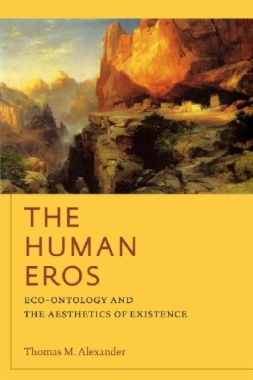The Human Eros explores themes in classical American philosophy, primarily the thought of John Dewey, but also that of Ralph Waldo Emerson, George Santayana, and Native American traditions. Alexander’s primary claim is that human beings have an inherent need to experience meaning and value, a “Human Eros.” Our
various cultures are symbolic environments or “spiritual ecologies” within which the Human Eros seeks to thrive. This is how we inhabit the earth.
Encircling and sustaining our cultural existence is nature, yet Western philosophy has not provided adequate conceptual models for thinking ecologically. Alexander introduces the idea of “eco-ontology” to explore ways in which this might be done, beginning with the primacy of Nature over Being but also including the recognition of possibility and potentiality as inherent aspects of existence. He argues for the centrality of Dewey’s thought to an effective ecological philosophy. Both “pragmatism” and “naturalism,” he shows, need to be contextualized within an emergentist, relational, nonreductive view of nature and an aesthetic, imaginative, nonreductive view of intelligence.
- Cover
- Contents
- Acknowledgments
- Introduction
- PART I: NATURE AND EXPERIENCE
- 1 The Aesthetics of Reality: The Development of Dewey’s Ecological Theory of Experience
- 2 Dewey’s Denotative-Empirical Method: A Thread through the Labyrinth
- 3 Between Being and Emptiness: Toward an Eco-ontology of Inhabitation
- 4 The Being of Nature: Dewey and Buchler and the Prospect for an Eco-ontology
- PART II: EROS AND IMAGINATION
- 5 The Human Eros
- 6 Pragmatic Imagination
- 7 John Dewey and the Moral Imagination: Beyond Putnam and Rorty toward an Ethics of Meaning
- 8 Educating the Democratic Heart: Pluralism, Traditions, and the Humanities
- PART III: AESTHETICS OF EXISTENCE
- 9 “Love Calls Us to Things of This World”: Santayana’s Unbearable Lightness of Being
- 10 Mountains and Rivers without End: The Intertwining of Nature and Spirit in Emerson’s Aesthetics
- 11 Creating with Coyote: Toward a Native American Aesthetics
- 12 Tricksters and Shamans: Eros, Mythos, and the Eco-ontological Imagination
- PART IV: SPIRIT AND PHILOSOPHY
- 13 Santayana’s Sage: The Disciplines of Aesthetic Enlightenment
- 14 Beauty and the Labyrinth of Evil: Santayana and the Possibility of Naturalistic Mysticism
- 15 The Spirituality of the Possible in John Dewey’s A Common Faith
- 16 Eros and Spirit: Toward a Humanistic Philosophy of Culture
- Bibliographic Essay on Resources for Native American Thought
- Index

